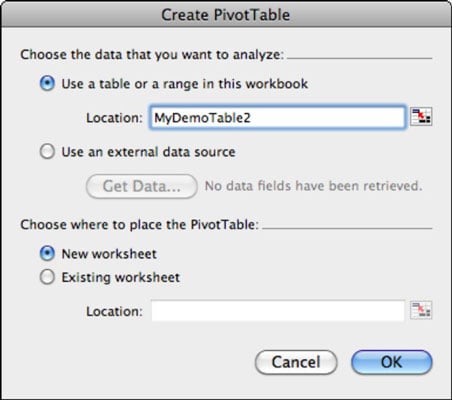
- Create named ranges for tables in excel on mac how to#
- Create named ranges for tables in excel on mac update#
- Create named ranges for tables in excel on mac code#
I have a price list for my products which is I use for my calculations, read more to create dynamic tables in excel. This function is used in the following way: =offset(reference, rows, columns, height, width), where height and width refer to the referred reference. It takes five arguments, all of which are mandatory. We can also use the OFFSET Function OFFSET Function The offset function in Excel displays the range of parts from the cell's start point. #2 – Using the OFFSET Function to create Dynamic Table in Excel Our dynamic Pivot table has automatically updated data of Product 6 in the pivot table. In the pivot table, refresh the pivot table. Now in Sheet where we have our table insert Another Data in 7 th.Click on OK and in the pivot tables, Drag Product in Rows and Sales in Values. As we have created the table, it takes a range as Table 2.read more section, click on pivot tables.

To use a table, click on the table and select the data range. Select the data and in the Insert Tab under the excel tables Excel Tables In excel, tables are a range with data in rows and columns, and they expand when new data is inserted in the range in any new row or column in the table.In the Insert tab, click on Tables under the tables section.Īs our data has headers so remember to check on the box “My Table has headers” and click ok.There are two basic ways of using dynamic tables in excel – 1) Using TABLES and 2) Using OFFSET Function. Pivot tables based on the dynamic table in excel can be automatically updated when the pivot is refreshed Pivot Is Refreshed To refresh pivot tables, you may use the following methods - refresh pivot table by changing data source, refresh pivot table using right click option, auto-refresh pivot table using VBA Code, refresh pivot table when you open the workbook.A dynamic range will automatically expand or contract as per the data change.The answer to that is because whenever a list or data range is updated or modified, it does not make certain that the report will be changed as per the data change.īasically, there are two main advantages of Dynamic Tables: Now the question arises why do we need Dynamic Range or Dynamic Tables. Excel has a solution for it as Dynamic Tables. read more or data in a workbook and make a report out of it, but if we add any data or remove one or move or change the data, then the whole report can be inaccurate. It may be created using the Data Validation tool so that users may select from a list rather than entering their own values. Similarly, in Excel when we create lists Excel When We Create Lists A list can be created in Excel to define a list of items/values as predefined values.

Dynamic Tables in Excelĭynamic in itself means a processor system characterized for a constant change or a change in activity.
Create named ranges for tables in excel on mac update#

Now if you have a new folder with new data files in it, you’ll be able to easily change the import folder path and refresh the query. In the query preview you will notice the Folder Path field values have updated.
Create named ranges for tables in excel on mac code#
Now in Query Editor we can add in our M code to create our query function.

Create named ranges for tables in excel on mac how to#
How To Import All Files In A Folder With Power Query Step 1: Create a query to get the named range.įirstly create a named range to reference. This will allow us to easily change the path of the folder and import different sets of files into Excel.įor this you’re going to need to be familiar with what we did in the previous post as this post takes off where that one left off. But what happens when we get a new batch of data files and we need to import them for analysis? In this post we are going to find out how to reference the folder path using a named range in our workbook. In a previous post we explored how to import all the files in a folder using power query.


 0 kommentar(er)
0 kommentar(er)
